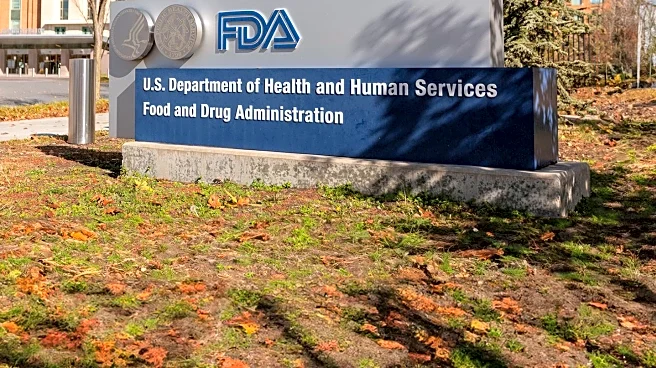What's Happening?
The FDA has announced the first recipients of its Commissioner’s National Priority Voucher program, which aims to expedite the review process for drugs addressing major national priorities. Nine assets have been selected, including treatments for infertility,
type 1 diabetes, nicotine addiction, congenital deafness, blindness, pancreatic cancer, porphyria, and domestic manufacturing of anesthetics and antibiotics. Companies awarded these vouchers will benefit from reduced review times, from the usual 10-12 months to 1-2 months, and increased interactions with the FDA during the review process. This initiative aligns with President Trump’s Most Favored Nation pricing scheme, focusing on unmet medical needs, domestic manufacturing, and drug price reduction.
Why It's Important?
The FDA’s priority voucher program is significant as it accelerates the availability of critical drugs, potentially improving patient outcomes and addressing urgent healthcare needs. By reducing review times, the program supports faster access to innovative treatments, which can be crucial for patients with conditions like congenital deafness and pancreatic cancer. Additionally, the focus on domestic manufacturing and price reduction aligns with broader economic and healthcare policy goals, potentially lowering costs and increasing the resilience of the U.S. drug supply chain. Companies like Disc Medicine and Regeneron stand to benefit from expedited approvals, enhancing their market position and investor confidence.
What's Next?
The FDA plans to announce additional voucher recipients in the coming months, indicating ongoing support for drugs that meet national priorities. Companies awarded vouchers are expected to proceed with their FDA filings, with potential approvals anticipated by the end of 2025. This could lead to increased competition in the pharmaceutical market, driving innovation and potentially lowering drug prices. Stakeholders, including healthcare providers and patients, may see improved access to new treatments, while pharmaceutical companies could experience accelerated growth and expanded market opportunities.
Beyond the Headlines
The priority voucher program may influence long-term shifts in the pharmaceutical industry, encouraging companies to focus on drugs that meet national priorities. This could lead to increased investment in research and development for conditions with unmet needs and foster collaborations between government and industry. Ethically, the program raises questions about prioritizing certain drugs over others, potentially impacting the development of treatments for less common conditions. Culturally, the initiative reflects a growing emphasis on healthcare accessibility and affordability, aligning with public demand for more equitable healthcare solutions.















